Venue
The University of Queensland School of Languages and Cultures invites you to attend 'We need to talk about Russia. And China. And so much more.'
We live in chaotic times, filled with news of conflicts in Ukraine, the Middle East, and rising tensions over China’s actions in the Indo-Pacific. Espousing the need for "multipolarity", Russia seeks to disrupt the established global order and re-assert its place as a 'Great Power'. In contrast, China seeks to displace US pre-eminence within that order.
Today, the geopolitical landscape is experiencing unprecedented shifts that demand fresh perspectives and deeper cultural understanding.
But despite this, Australia is facing a worrying decline in linguistic and cross-cultural literacy. Without an understanding of histories, cultures and languages, we run the risk of making poor choices about how Australia navigates these tectonic shifts.
This panel seeks to discover what steps we need to take as a nation to secure our future. Join us to explore the current global conflicts and their impact on the world order and the rule of international law that has underpinned Australia’s security, prosperity, and stability for the past seventy years.
Event details
Date: Wednesday 9 October 2024
Time: 5:15pm for 5:30–6:30pm, followed by light refreshments 6:30–7:30pm
Location: River Room, Customs House, 399 Queen Street, Brisbane City
Enquiries: engagement@hass.uq.edu.au
Panellists
Mr Peter Tesch
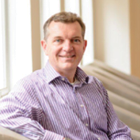 A Brisbane-born graduate of UQ, Peter retired from the Australian Public Service in August 2022 after 35 years in the Department of Foreign Affairs and Trade (DFAT) and the Department of Defence.
A Brisbane-born graduate of UQ, Peter retired from the Australian Public Service in August 2022 after 35 years in the Department of Foreign Affairs and Trade (DFAT) and the Department of Defence.
From May 2019 he was Deputy Secretary, Strategy, Policy, and Industry in the Department of Defence, leading a group of more than 500 people, with a budget of over $700 million. He was Australia’s lead on AUKUS Pillar Two, focused on developing advanced warfighting capabilities for the Australian military.
Peter’s DFAT roles included: Ambassador to the Russian Federation (2016-2019); head of the International Security Division (2014-2015); Ambassador to Germany (2009-2013); Deputy Permanent Representative to the United Nations (2002-2005); Ambassador to Kazakhstan (1997-1999); and Third Secretary, Moscow (1989-1991). He also served in the Office of the Minister for Trade (1993-1994) and as Deputy Director of the Victorian State Office (1994-1996).
He is an Adjunct Professor in the School of Languages and Cultures at The University of Queensland and a Visiting Fellow at the Centre for European Studies, Australian National University. Peter has a Bachelor of Arts degree with Honours and a Doctorate of Letters honoris causa from The University of Queensland. He speaks German and Russian.
Mr Peter Varghese AO
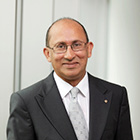 Peter Varghese has been Chancellor of The University of Queensland since 2016. Prior to this appointment, Mr Varghese held several senior positions in the Australian Public Service in Canberra and overseas. He has served as Secretary of the Department of Foreign Affairs and Trade, High Commissioner to India, High Commissioner to Malaysia, Director-General of Australia’s peak intelligence agency the Office of National Assessments, and Senior Advisor (International) to the Prime Minister.
Peter Varghese has been Chancellor of The University of Queensland since 2016. Prior to this appointment, Mr Varghese held several senior positions in the Australian Public Service in Canberra and overseas. He has served as Secretary of the Department of Foreign Affairs and Trade, High Commissioner to India, High Commissioner to Malaysia, Director-General of Australia’s peak intelligence agency the Office of National Assessments, and Senior Advisor (International) to the Prime Minister.
Mr Varghese was the author of a comprehensive India Economic Strategy to 2035 commissioned by the Australian Prime Minister and submitted in July 2018.
Mr Varghese was educated at The University of Queensland, graduating with a Bachelor of Arts with Honours and a University Medal in history. He was appointed an Officer in the Order of Australia (AO) in 2010 and received an Honorary Doctorate of Letters from The University of Queensland in 2013.
Mr Varghese sits on the boards of CARE Australia and North Queensland Airports and chairs Asialink’s advisory council and the Department of Foreign Affairs and Trade Editorial Advisory Board. He is also on the international governing board of the Rajaratnum School of International Studies in Singapore. He was awarded the Sir Edward “Weary” Dunlop Asialink Medal in 2019 in recognition of outstanding contributions to improving Australia-Asia relations.
Isabella Currie
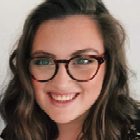 Isabella Currie is an Associate Lecturer and PhD candidate at La Trobe University, specialising in international relations and political science. Her research is focused on the Wagner Group, a private military organisation closely linked with the Putin regime, and its role in shaping global dynamics. Isabella's work explores themes of foreign interference, authoritarianism, and the strategic use of private and semi-state actors to exert influence and project power on the international stage.
Isabella Currie is an Associate Lecturer and PhD candidate at La Trobe University, specialising in international relations and political science. Her research is focused on the Wagner Group, a private military organisation closely linked with the Putin regime, and its role in shaping global dynamics. Isabella's work explores themes of foreign interference, authoritarianism, and the strategic use of private and semi-state actors to exert influence and project power on the international stage.
Through her research, she provides an examination of the methods and tools used by the Wagner Group, with a particular focus on its operations in Africa and Syria. Isabella's analysis also extends to the role of Yevgeny Prigozhin, the group's former leader, and the broader implications of the Wagner Group's activities for global security and international relations.
Associate Professor Matthew Sussex
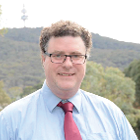 Dr Matthew Sussex is Associate Professor (Adjunct) at the Griffith Asia Institute, Griffith University; Visiting Fellow at the Strategic and Defence Studies Centre, ANU; and Visiting Fellow at the Centre for European Studies, ANU. His research specialisations revolve around national security and strategic studies with a particular focus on Russia and Eurasia, Australian national security policy, great power politics, and information warfare. In addition to his books and articles dealing with these themes, he was nominated for a Walkley award in 2023 for his analyses of Russia's war in Ukraine.
Dr Matthew Sussex is Associate Professor (Adjunct) at the Griffith Asia Institute, Griffith University; Visiting Fellow at the Strategic and Defence Studies Centre, ANU; and Visiting Fellow at the Centre for European Studies, ANU. His research specialisations revolve around national security and strategic studies with a particular focus on Russia and Eurasia, Australian national security policy, great power politics, and information warfare. In addition to his books and articles dealing with these themes, he was nominated for a Walkley award in 2023 for his analyses of Russia's war in Ukraine.
Matthew has previously been Senior Fellow at the Australian Defence College; Associate Professor and Academic Director at the National Security College, Australian National University; and Head of Politics and International Relations at the University of Tasmania. He has been awarded research grants from the Australian Research Council, the Fulbright Commission, the ISA, Australian government agencies, and others. He has also been a non-resident Fellow at the Lowy Institute for International Policy; served on the National Executive of the Australian Institute of International Affairs; and has been the Associate Editor of the Australian Journal of International Affairs. He is regularly invited to brief government, academic specialists and think tanks on his areas of expertise. He provides frequent analyses for local, national and international media, including BBC, CNN, Bloomberg and others.
Associate Professor Sarah Percy (moderator)
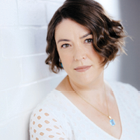 Sarah Percy arrived at UQ from the University of Western Australia in 2016. Prior to her appointment at UWA, Sarah was University Lecturer and Tutorial Fellow in International Relations at the University of Oxford (Merton College). At Oxford, Sarah was on the steering committee of the Oxford Programme on the Changing Character of War. Sarah did her M.Phil and D.Phil as a Commonwealth Scholar at Balliol College, Oxford.
Sarah Percy arrived at UQ from the University of Western Australia in 2016. Prior to her appointment at UWA, Sarah was University Lecturer and Tutorial Fellow in International Relations at the University of Oxford (Merton College). At Oxford, Sarah was on the steering committee of the Oxford Programme on the Changing Character of War. Sarah did her M.Phil and D.Phil as a Commonwealth Scholar at Balliol College, Oxford.
Sarah has three main research areas. She has had a long-standing interest in unconventional combatants, and has published widely on mercenaries, private military companies, and pirates. Sarah is interested in issues of maritime security generally, including piracy and counter-piracy, maritime crime, and the role of navies as security actors. She also conducts research at the nexus between international relations and international law, and is interested in how and why the use of force is regulated, and the relationship between norms and international law.
